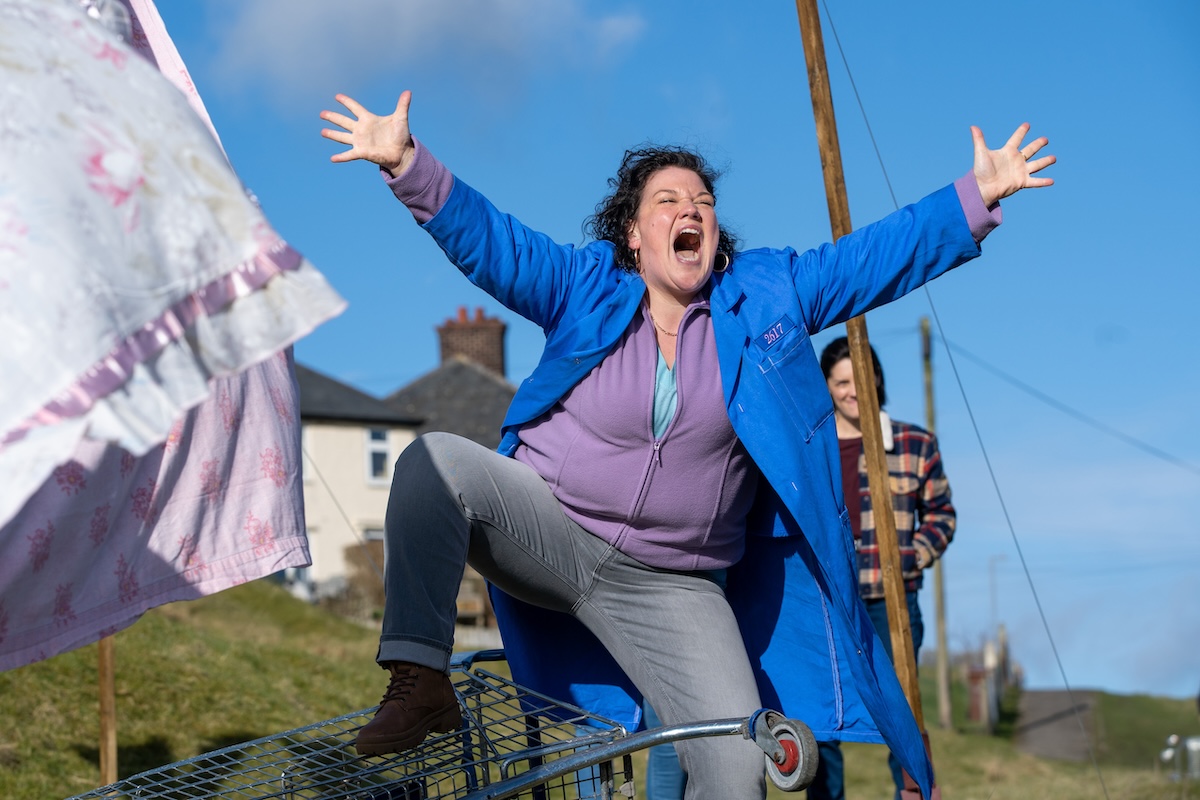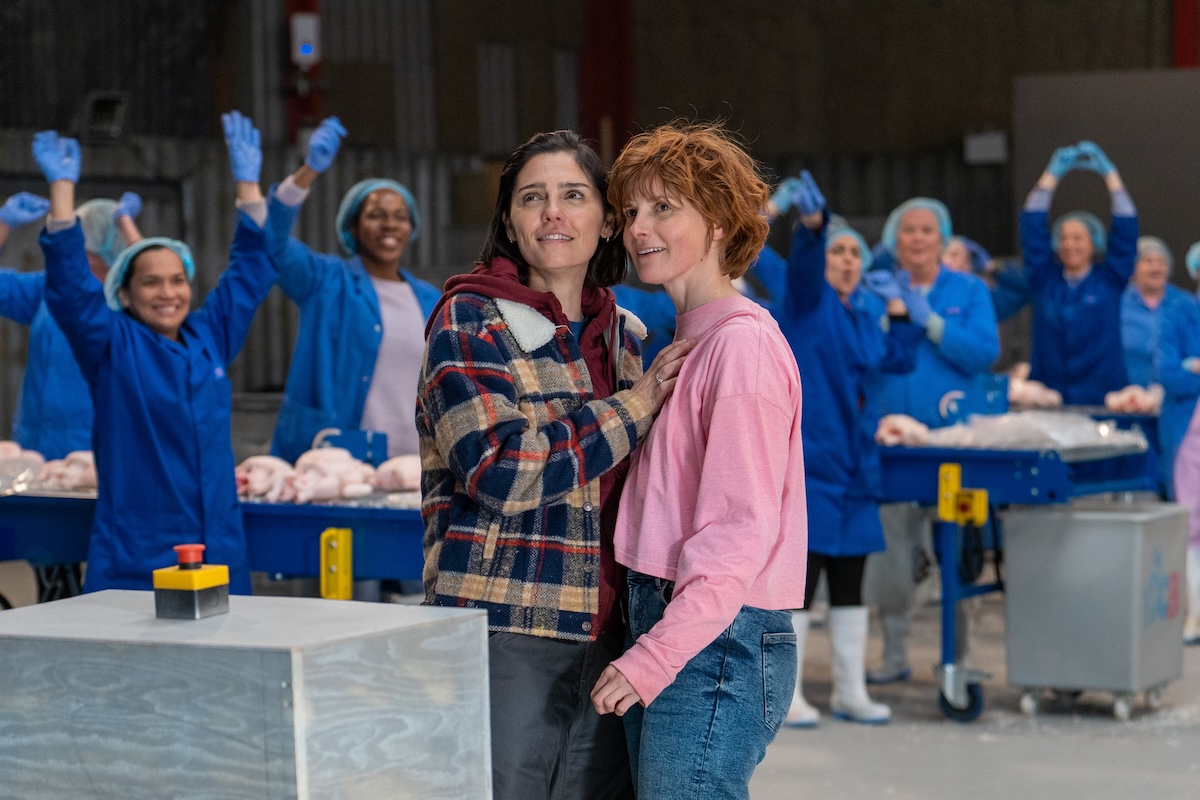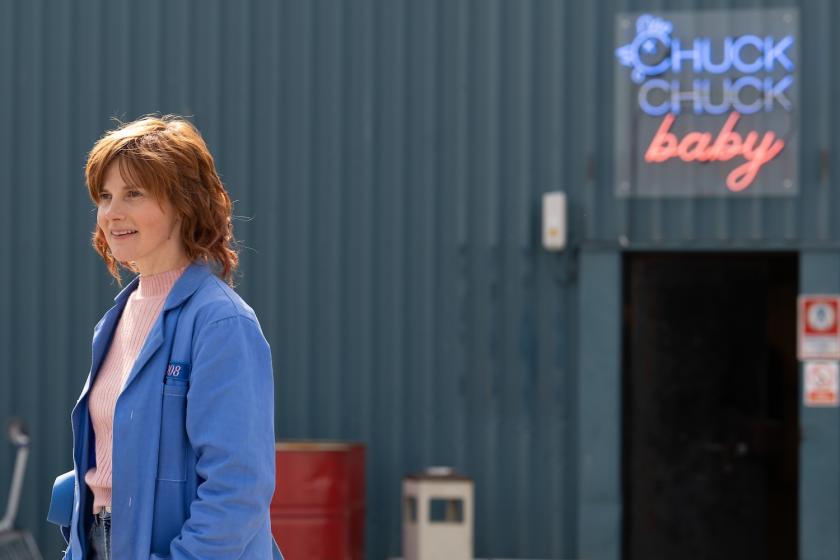As Janis Pugh’s semi-autobiographical Chuck Chuck Baby draws to a close, the camera fondly plays around the smiling faces of some of its voiceless female characters – careworn middle-aged workers in a Welsh chicken processing factory. They're cheered by finally seeing something good happen to one of their number. It’s the romantic musical drama’s most loving visual aside – the poultry packers’ ingrained pain and disappointment momentarily forgotten.
The woman in question is Helen (Louise Brealey), at the start a near-broken drudge, pushing 40 and consigned to domestic misery, her only noticeable gifts her kindness and capacity for self-sacrifice. Though her spark hasn’t been entirely extinguished, Helen has been paralysed by inertia, feeling obliged to support her odious husband, Gary (Celyn Jones), his vacuous 20-year-old live-in Scouser girlfriend, Amy (Emily Fairn), and their newborn, and Gary’s bedridden mother, Gwen (Sorcha Cusack).
They dwell inharmoniously in Gwen's house on a dispiriting estate in Pugh’s native Flintshire. Rejected by Gary because she couldn’t bring a baby to term, Helen has for years slept alone in the room she intended as a nursery, staying on to tend Gwen, the ailing fairy godmother she loves.
 Shyly hiding her beauty, Helen has been kept going by the warmth and raucous banter of her workmates – empathetic Clare (Cat Simmons), canny Lynn (Emily Aston), ebullient (and tactless) Paula (Beverly Rudd, pictured right), and perceptive Katrina (Edyta Budnik), who gives the others impromptu morale-boosting haircuts in the loos.
Shyly hiding her beauty, Helen has been kept going by the warmth and raucous banter of her workmates – empathetic Clare (Cat Simmons), canny Lynn (Emily Aston), ebullient (and tactless) Paula (Beverly Rudd, pictured right), and perceptive Katrina (Edyta Budnik), who gives the others impromptu morale-boosting haircuts in the loos.
The shock to the system Helen needs arrives in the shape of her former high-school crush, Joanne (Annabel Scholey), a self-contained but traumatized pylon-maintenance technician. The pair tentatively flirt their way toward consummating the love they suspended two decades previously. In fact, they never even spoke – can you love someone you never spoke to? Maybe.
After a 20-year absence, Joanne has returned to the town she left after being sullied by her father, the repeated abuse (not involving actual sexual contact apparently) gloatingly observed by Gary and other troglodytes; when, anticipating Helen’s defection, Gary calls Joanne “filthy”, he’s unknowingly referring to his pathological gynophobia. Viewers of all genders and persuasions should be able to relate to Chuck Chuck Baby’s slowburning romance, but writer-director Pugh doesn’t conceal her rage at the inhumane ways some men treat women.
Her movie is laced with delicate visual and aural flourishes rare in earthy, humour-tinged dramas about the travails of working-class women. Cinematographer Sarah Cunningham’s procession of flat establishing shots distilling the region’s urban dreariness means the counterpointing shots lyricizing Helen and Joanne’s amorous dance are all the more effective. Helen excitedly threads her way toward Joanne between sheets and strips of cloth hanging on clotheslines. The camera tilts down from a sun and sea crayoned on a sheet to Helen lying in an outdoor bath fully clothed, whereupon Joanne jumps into the bubbles. It’s a hypnotically sensual sequence that wouldn’t have worked if they’d already had sex; that it takes place on a washing day is a reminder that, for women like this film's, every day is washing day. (Pictured below: Annabel Scholey, Louise Brealey)
 Pugh has Helen and Joanne and their mates sing along with (rather than lipsynch, Dennis Potter-style) popular songs that express their pent-up feelings and existential dilemmas. Brealey – magnificent here, her Helen an over-brimming well of emotion – wrings torment and defiance from Neil Diamond’s “I Am…I Said” as she drives along the Dee Estuary shore to work.
Pugh has Helen and Joanne and their mates sing along with (rather than lipsynch, Dennis Potter-style) popular songs that express their pent-up feelings and existential dilemmas. Brealey – magnificent here, her Helen an over-brimming well of emotion – wrings torment and defiance from Neil Diamond’s “I Am…I Said” as she drives along the Dee Estuary shore to work.
In the blue-black shadows of Joanne’s unchanged teenage bedroom, its walls festooned with pictures of women actors, singers, and models, Scholey renders Janis Ian’s “From Me to You” a rueful commentary on why she had to leave her dad’s house before she and Helen could do more than exchange glances at school.
Best of all is Brealey’s dance of sexual reawakening as, astonishing and thrilling her fellow workers, she trills along with touching amateurishness to Minnie Riperton’s “Les Fleurs” as chicken feathers fall on the factory floor. Here and there, Pugh rhymes the feathers with floating dandelion pappi; such gossamer love emblems and the appearance of blue magic mushrooms discovered on a hilltop by Helen’s work crew during a rural jaunt fleetingly endow the film with the kind of airy Shakespearian enchantment Bill Forsyth practiced in his films.
Like Forsyth, Pugh knows when to bring her characters back down to earth – grim realities being inescapable in North Wales. In fact, the misogynistic drives and agendas that long kept Helen and Joanne apart rear up again to cast doubt on an ending that has long seemed inevitable – notwithstanding which, Helen neatly catches a last windblown puffball with a gleam in her eye.















Add comment